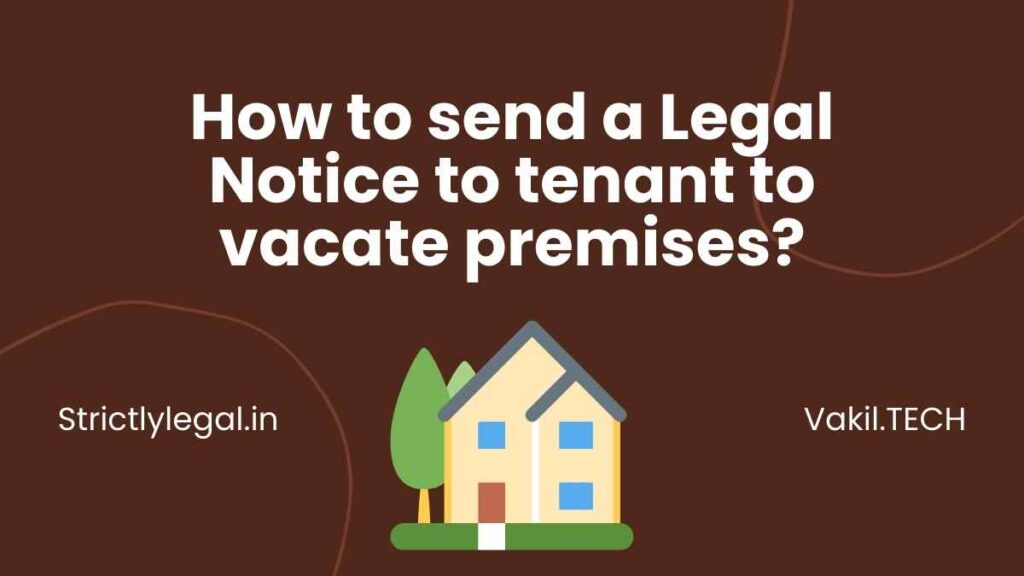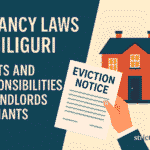A legal notice to tenants to vacate premises is a document issued by the landlord to their tenant to vacate the property that they are currently renting. This can be for several reasons: if the tenant has not paid rent, if the tenant has violated any of the terms in their agreement, or if the landlord is going to renovate or sell the property. The legal notice gives a deadline for when this eviction has to happen by and notes any potential consequences for non-compliance.
Evicting a tenant is never fun. But it can become a necessity, especially when you have something like an unruly tenant or a tenant who has stopped paying rent. If you have made up your mind that you want to evict your tenant, the first step is to serve them with a legal notice; this will inform them that you are starting the process of evicting them.
Table of Contents
Two types of notices:
1) The first type of notice is the Eviction Notice, also called a Notice to Quit. This notice informs the tenant that they have a certain amount of time to leave the property, or they will be forcibly evicted by law enforcement officials. The amount of time they are given depends on the laws in your state and county.
2) The second type of notice is called a Pay Rent or Quit Notice. This notice informs the tenant that they must pay their rent (or make up for any back-owed rent) within a set period of time, or they will be asked to move out.
In this article, we’ll discuss how to write a notice to a tenant to vacate the premises.
A notice to a tenant to vacate is typically written by the landlord at the end of a lease term or when they’re evicting the tenant for cause. You can also write a notice of eviction if you need your tenants to move out due to renovations that are happening on the property, or if you’re selling the home and need them out before closing. The notice will be sent via registered mail, which means it’s been delivered by someone in person and they’ve signed off on it so that there’s proof it was received. If the tenant hasn’t vacated within 30 days, then you can begin eviction proceedings which may involve filing an application for eviction at your ren control authority and which will ultimately fetch you an order that instructs law enforcement officers to remove trespassers from your property.
Want to send an Eviction Notice to your Tenant?
Grounds to Evict a Tenant For which Notice can be Sent?
Here are the grounds for eviction of tenants in India:
Not Paying Rent
If your tenant is not paying the rent on time, then you can use this as a ground for eviction. You can send a notice to him or her and if he or she does not pay the rent even after that, then you can proceed with the eviction process.
Sub-Rented Property
If your tenant has sub-rented all or part of the property without your permission, then you can use this as a ground for eviction of your tenant. You can also evict your tenant if they have made any illegal changes to your property without your permission.
Unlawful Use of Property
If you have let out your property to a tenant for residential purposes but he or she is using it for commercial purposes like running a business, then you can use this as a ground for eviction. If you have rented out an independent house to your tenant and he or she has started building another house on it or given it on rent to someone else or has destroyed the property in any other way, then you can also use this ground for evicting your tenant.
The landlord needs the property for own use
If you need your house for your own use or for any member of your family, you can ask your tenant to vacate the property. However, if you have been using another accommodation in place of that property or have rented it out within three months before asking for possession, this ground will not apply to you.
Repairs and renovation
You can ask your tenant to move out to carry out major repairs or renovations. However, if the house is inhabitable, you cannot use this ground.
Violating the terms of the lease agreement.
These are just a few major reasons, but there are many others. However, the most important thing you should keep in mind is that you cannot evict your tenant arbitrarily. You should have strong grounds for doing so. The law has given this right to tenants to avoid any sort of malicious eviction by their landlords.
Conclusion
The most common ground for eviction of a tenant is non-payment of rent. However, there are many other circumstances in which a landlord can evict a tenant for using the premises for illegal purposes or subletting the property without the consent of the landlord. The tenant also can be evicted if he/she causes damage to the rented property.
The tenant also can be evicted if he/she causes damage to the rented property.
The landlord needs to follow proper procedure before evicting the tenant. In the case of urban regions, an application needs to be filed with Rent Controller Office and served upon the tenant. The notice must specify the grounds on which eviction is sought, such as non-payment of rent or subletting. Any counterclaims by the tenant should also be included in this notice.
FAQ
TO evict a tenant you must follow the rules as has been prescribed under the West Bengal Premises Tenancy Act i.e by giving notice for eviction and then seeking an order for eviction at the rent control authority.
If a tenant refuses to leave you can get a decree from the court for his eviction and the local administrative body such as the police will help you evict such tenant.
Technically, Yes! if you have an agreement and the tenant breaches any condition or the agreement expires then in such a case your landlord has every right to evict you.
Not paying rent is a breach of one of the conditions for evicting a tenant as per the provisions of law prevailing in India. You can send him a demand notice and or eviction notice in case your tenant does not pay the rent.
Legally landlords are not allowed to change locks. It could sometimes be very difficult to evict a tenant if a landlord practices such behaviors. It is always advised to follow the due procedure for eviction.

Passionate about using the law to make a difference in people’s lives. An Advocate by profession.





